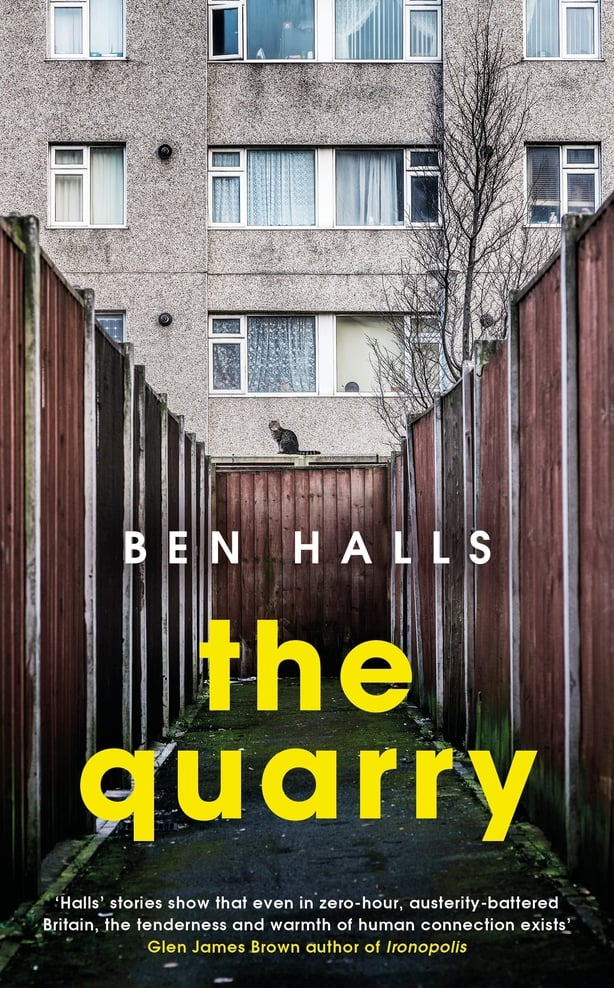Unable to do much more than protest at the meagre quality of their lives, Ben Halls's characters boldly rattle the bars of urban entrapment in wonderful stories, most of which are set in the eponymous council estate near London.
The opening story Ham is told by a 25-year-old guy who feels his life is a dead end. He feels somehow cheated for fulfilling a promise to his dad – who lit out for Spain years ago – that he would stay in school until he was 18. The story builds towards an angry coda which juxtaposes fantasies of reconciliation and assault. Halls has the frenetic, irritable tone one would expect in such a narrative just right.
Bit of me was glad he’d wrote me and just me, felt special, and a bit of me didn’t want to upset her. She got all odd when she weren’t sat watching the telly so I thought I’d leave her be. I stuck it down the bottom of me drawer.
When the story shifts to the third person, the supple writing still holds up wonderfully.
He leaves his home in The Quarry estate and drives to his job at Tesco, it’s Saturday morning. Cold enough your breath blows smoke, even indoors. Still dark at six when I roll up to work, parking up me clapped-out Corsa next to the other beat-up motors that are at Tesco’s that time of day. Sun ain’t nowhere to be seen, the lazy shite. Streetlights picking up the slack.
The second story Little Ones is a marvel. A nightclub bouncer, a reflective, thoughtful man, finishes work in the small hours after the mayhem of the Friday night disco. It’s the same disco which the protagonist of the opening story attended, all the stories are loosely interconnected.
The narrator drives into London in the small hours on what might be a whim. He pulls in at a filling station, buys what seems to be an innocuous bunch of flowers, and chats to the lone night attendant behind the counter. Dawn breaks, he makes his way to a graveyard where he lays the bought flowers on the graves of his wife and daughter. The story burns and builds with a quiet flame, iridescent, numinous, magnetic.
Dreamers introduces the young Mohammed who doesn’t speak Hindi although people assume he does. He has started work at a Paddy Power betting shop and has requested that his name tag be reworked as 'Mo' rather than 'Mohammed.' His brandy-swigging father wants him to work in his warehouse business, but Mohammed wants to make his own life.

His dream in fact is kind of nascent bourgeoisie, and he fantasises about being able to 'wear jumpers over collared shirts when you walk your dog to the pub.' Reconciliation not to speak of warehouse work, is not likely following his father's assault on Mohammed following his first bender, unused to drink and led astray by a sneaky, manipulative acquaintance.
In Central, two friends are on a night in Central London, at a casino in the Leicester Square area of London. Briscoe is home from what he tells people is an exotic life at sea. Nick is the perceived loser, still stuck in The Quarry, overweight and spending far too much time idling on the computer at home.
Then Briscoe suddenly hits the jackpot and wins £10,000 – cue a night of drink and the company of two young women. The two mates lose each other briefly but link up again at a nearby hotel where Briscoe has repaired with the two females. In the hotel lobby, Nick sees a group of women in their late forties or early fifties, cackling lecherously as drinks are served.
Maybe they should realise that no amount of spin classes, make-up and body-shaping underwear will make them look like they did when they were twenty-five.
Later he reflects on the reality of his own sad life, buttoning up his loneliness. What kind of man sits down at a bar and complains that he hasn’t had sex in a few years, but feels more lonely than frustrated because of it?
At the close, the author deftly turns the drift of the story around in one of those neat flicks of perception at which he excels. Briscoe is suddenly diminished in his macho vanity and Nick is restored to a position of relative superiority, despite his seemingly pointless life.
In Kate, the wife of that name is diagnosed with cancer and dies before her expected time. Following her passing, the new widower, a retired man, reflects on their marriage in the empty house, pottering around the rooms, a half- eaten packet of his wife’s favoured lemon slices in the fridge.
Even finishing up at the hospital wasn’t what I expected it to be. I thought they’d understand, that they’d be there to counsel at least a little bit; a paradox of pain which is universal yet understood to be unique.
This particular tale allows an exotic break away from the dismal Quarry scenarios, as his protagonist recalls a holiday trip to Le Touquet in France, an eighth wedding anniversary, decades before.
Halls’ brand of dirty realism aspires towards something clean and pristine and his debut stories would make an ideal book club choice.







